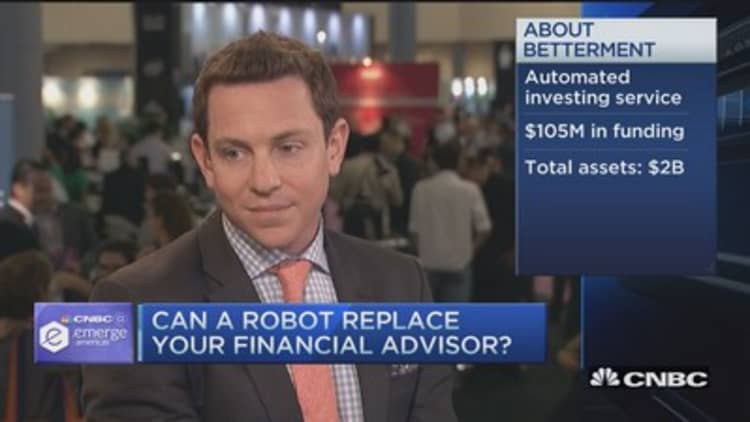Jon Stein is putting on a brave face, but the market is turning against the CEO of the largest stand-alone robo-advisor in the country.
"I doubt we'll be the last robo-advisor standing, but it's possible," said Stein, who launched his firm, Betterment, in 2010. "We're building the future of investing, and we've always expected to have lots of competition."
Stein is a trailblazer in the business of low-cost, automated financial advice. A Harvard graduate with an MBA from Columbia, Stein has built Betterment into the fastest-growing robo-advisor in the industry, with $4.4 billion in assets and 160,000 customers.
Betterment's web-based platform has sophisticated and easy-to-use tools to build and manage a diversified investment portfolio. It automatically rebalances portfolios to target allocations and has an app for efficient tax-loss harvesting. Clients can get the service for between 15 and 35 basis points — a fraction of the cost that a human financial advisor typically charges.
"We have the brand, the reputation and the scale to say we're going to make a dent in this industry," Stein said. "Our challenge is great, but we want to be the premiere financial services company in the next 100 years."
He'll have to get through the next couple of years first. While low-cost robo-advisor offerings such as Betterment would seem to be a major disruptor of the advisory industry, the economics underlying the stand-alone robo-advisor business model are not good.
Morningstar senior equity analyst Michael Wong believes that with their current fee structures, robo-advisors need between $16 billion and $40 billion in assets under management to break even.
With Betterment's average account size of $27,000, it makes less than $100 in fees per customer annually. Wong estimates that the robo-advisors have an average cost of about $1,000 to acquire each client — meaning it could take more than a decade to recoup just their client-acquisition costs.
There will probably be just a couple of stand-alone firms that survive, another handful will be acquired, and we'll see a lot of failures.Michael Wongsenior equity analyst at Morningstar
The venture capital investors financing the robo-advisors are starting to fret over the numbers. Betterment raised $100 million in VC money in March, but it is the only robo-advisor that has successfully tapped the market for more money this year.
Many analysts believe the window to access additional capital is rapidly closing on stand-alone robo-advisors, and without it they won't be able to build enough scale to survive.
"The robo-advisors will leave a lasting legacy in the wealth management industry, [and] they've prompted a lot of changes at advisory firms," said Wong, who issued a prescient report on the robo-advisors last March. "But there will probably be just a couple of stand-alone firms that survive, another handful will be acquired, and we'll see a lot of failures."
The legacy will be a near-universal rollout of robo-advice technologies by incumbent players in all distribution channels of the advisory industry. UBS, the world's largest wealth management firm by global assets under management, is the latest major firm to take the plunge.
It signed a deal with Silicon Valley–based robo-advisor SigFig on May 16 to put SigFig's digital tools in the hands of UBS's more than 7,100 financial advisors in the United States. Details of the deal were not disclosed, but UBS made an equity investment in SigFig, and the two have created a research group to develop new wealth management technology tools for UBS advisors to use.
"We're agnostic about whether to build or buy these capabilities," said Tom Naratil, president of UBS Americas. "We felt we could get what we needed faster and cheaper with SigFig.
"We're taking the world's most productive advisor force and making it more productive," he added.
For SigFig, the benefits of the deal are obvious.
"Our mission is to make financial advice available to as many people as possible," said Mike Sha, CEO of SigFig. "This deal gives us scale and helps us reach large numbers of people in different segments of the market."
The deal also allows SigFig to spend its limited capital on new technologies rather than marketing and advertising campaigns.
The daunting challenge of attracting customers has robo-advisors rethinking their strategies. The huge splash that Vanguard Group and Schwab made with their entries into the robo-advice market last year was a big catalyst. Both firms quickly amassed far more assets than any of the stand-alone robo-advisors.
SigFig's pivot from a direct-to-consumer model to a business-to-business model is a sign of the times for the industry, as robo-advisors look for incumbent firms to provide ready customers rather than spend their cash to acquire them.
Betterment has also established an institutional division to market to advisory firms. Notable acquisitions of robo-shops by advisory and asset management firms include Jemstep by Invesco, eMoney by Fidelity Investments, LearnVest by Northwest Mutual Insurance and FutureAdvisor by BlackRock.
Asset manager BlackRock is marketing the FutureAdvisor platform to advisory firms, banks and brokerages that don't want to build or buy their own infrastructure. It has already signed agreements with LPL Holdings, RBC Wealth Management and BBVA and is talking to many more prospective customers, said Frank Porcelli, chairman of BlackRock's U.S. Wealth Advisory business.
"The landscape is rapidly changing, and our partner firms want technology solutions for different market segments," Porcelli said. "They want a combination of digital and personal advice capabilities.

"I think it will become a core offering at most firms," he added.
Porcelli also thinks the estimates of growth in the automated-advice space — consultant A.T. Kearney has projected $2 trillion in assets by 2020 — are not so outlandish.
"Overall, wealth management firms are advising about $12 trillion in assets," Porcelli said. "It's not a stretch to see 10 [percent] to 20 percent of that managed by [robo-platforms].
"If existing wealth managers continue adopting digital platforms, we could hit those numbers," he added.
Unfortunately for Stein and Betterment, early industry trailblazers may not be the ones to reap the biggest benefits.
— By Andrew Osterland, special to CNBC.com




